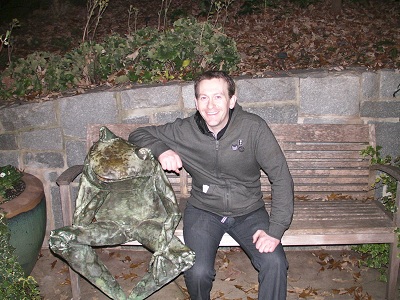
Name: Mark Lamias, Consultant to the Centers for Disease Control and Prevention (CDC) for Science Applications International Corporation (SAIC)
- Education: B.S. in Statistics and Political Science, Pursuing Ph. D. in Statistics
- Target Audience: Middle School
Think you have to be a natural in order to pursue a career in math? Think again. After turning a corner in college, this former hater of math now uses statistics to help solve some of the world's most pressing health concerns. Read on to find out why being a statistician is such a cool job!
What is your job?
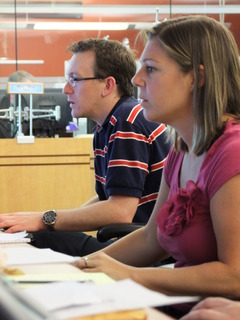 I work as a contractor with the US Centers for Disease Control and Prevention, conducting surveys and analyzing data primarily for infectious disease outbreaks. Whenever there is an outbreak - such as the listeria outbreak that recently surfaced in cantaloupe - I am often called on to assist in the data collection and analysis effort. In times of an outbreak, we usually just start with the knowledge that people are getting sick. We don't know how, why or how many people are getting sick. That is when people like me are called in to put together questionnaires and surveys that go out into the public. These questionnaires are aimed at discovering what the people with the illness have in common with people who have not gotten ill, as well as what they don't have in common. When we get the data back from these questionnaires, one of my jobs is to then analyze that data and find the differences between those who are well and those who are ill so we can determine the source and cause of the outbreak.
I work as a contractor with the US Centers for Disease Control and Prevention, conducting surveys and analyzing data primarily for infectious disease outbreaks. Whenever there is an outbreak - such as the listeria outbreak that recently surfaced in cantaloupe - I am often called on to assist in the data collection and analysis effort. In times of an outbreak, we usually just start with the knowledge that people are getting sick. We don't know how, why or how many people are getting sick. That is when people like me are called in to put together questionnaires and surveys that go out into the public. These questionnaires are aimed at discovering what the people with the illness have in common with people who have not gotten ill, as well as what they don't have in common. When we get the data back from these questionnaires, one of my jobs is to then analyze that data and find the differences between those who are well and those who are ill so we can determine the source and cause of the outbreak.
As a statistician, I experience a nice blend of both science and technology. In order to carry out the science of statistics, I really need to have technology by my side. Statisticians become very adept at using software, and to some extent programming, in order to organize data. Typically, I use a technology called SAS (which stands for Statistical Analysis System), which is used in conjunction with our various database technologies. There is also software used by the statistical community called R or S-PLUS, which helps to visualize data and performing analyses. HTML and web-based technologies are also important as we move away from paper and pencil data collection and develop questionnaires that can be accessed securely over the Internet.
Why did you choose this career?
If you would have told me in high school that I was going to go into statistics, I would have said you were crazy. I hated math, and I thought I was quite poor at it as well. I went into college with the idea that I would enter a career in politics and work in government, and I had no desire to do anything math- or science-related. So, when one of my political science courses required me to take a prerequisite math course, I was terrified. However, I think college gave me a different way of looking at math than I had in high school. It's amazing what a difference the style of teaching can make, because I think I really turned a corner in my college math classes. I started to re-learn everything in a way that made more sense to me and seemed a bit more intuitive. I developed a new appreciation for the power of math and scientific thinking - specifically statistics. I could see the power in it. For example, I found it really interesting that you could predict the outcome of a football game or a presidential election based on past results. That's what really made me interested in learning more about the subject.
Explain what an average day at work is like for you.
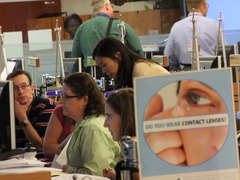 There is a lot that goes into the work that I do. We initially start out with a hypothesis about what is causing a disease (i.e., a foodborne outbreak) based upon anecdotal reports we initially receive. Once we have a hypothesis we incorporate questions into a survey that aim to provide evidence for or against our hypothesis. For example, if we had a hypothesis that there was a salmonella outbreak that was being caused by lettuce distributed by a specific grocery store, we may formulate questions about lettuce and where people have shopped. Once the data is collected, we analyze it to see what percentage of the people who ate lettuce at grocery store x became ill compared with the percentage of the people who ate lettuce at grocery store y and became ill. With various statistical methods, we can then use this information to determine how likely it is that the difference we are seeing is actually due to the lettuce as opposed to chance or some other factors.
There is a lot that goes into the work that I do. We initially start out with a hypothesis about what is causing a disease (i.e., a foodborne outbreak) based upon anecdotal reports we initially receive. Once we have a hypothesis we incorporate questions into a survey that aim to provide evidence for or against our hypothesis. For example, if we had a hypothesis that there was a salmonella outbreak that was being caused by lettuce distributed by a specific grocery store, we may formulate questions about lettuce and where people have shopped. Once the data is collected, we analyze it to see what percentage of the people who ate lettuce at grocery store x became ill compared with the percentage of the people who ate lettuce at grocery store y and became ill. With various statistical methods, we can then use this information to determine how likely it is that the difference we are seeing is actually due to the lettuce as opposed to chance or some other factors.
Are there any projects that you've worked on that have been very exciting for you?
I have worked on projects aimed at public health surveillance too. Surveillance activities take place to measure the current state of illness within a defined population. We use these measures to identify outbreaks and to recommend strategies and interventions for prevention. For instance in the US we monitor the number of people ill with specific types of foodborne diseases. If we see a surge in the numbers then we will investigate more closely to determine if there is an outbreak. If there is an outbreak, and we can identity the cause, we may recommend strategies to prevent the outbreak from occurring again in the future -- for example, recommending food handlers wash their hands after using the restroom. We might also monitor over the counter drug sales and the symptoms of people presenting to hospital emergency rooms. Seeing spikes in certain drug purchases or certain symptoms might be an indicator of an early bioterrorist attack. We work very closely with doctors, epidemiologists and microbiologists to determine if what is going on is "normal" and harmless or if it is something more nefarious, like someone trying to poison a drug or food supply. If it is an attack, we can get people assistance as soon as possible and recommend ways to minimize the impact of the attack.
What do you like best about your job?
I think the thing I like most is that every problem is different. There may be similar processes, but no two outbreaks are the same. You always have to adapt and change because a lot of time these disease outbreaks have lives of their own.
There is also a lot of cross-learning. I am not a physician or a microbiologist, but I get to learn a lot about medicine and microbiology. I get to learn a large amount of different subject matter based upon the different people I interact with every day. On any given day, I may interact with 40 people who each have a different job title and training. One moment I may be meeting with a database engineer, and the next moment I may be meeting with a radiologist or an infectious disease specialist. All of these different types of people come together and share their knowledge in a way that we can all learn from each other.
When you were a kid, did you like science, engineering and/or math?
I always liked social science courses such as social studies, political science, sociology and economics. When I was in middle school and high school there was very little application of mathematics to those subjects. As I got to college, however, I realized how much mathematics really does apply to the social sciences. If you want to conduct a study on presidential elections, having good knowledge in statistical models will go a long way to help you to develop theories and to test them. I also really enjoyed writing. In my opinion, one of the most underappreciated skills in science is the ability to write clearly and communicate effectively. I have never had to prepare statistical information that I didn't then need to pass along to someone else, be it a boss, a client, or the public. It is also sometimes necessary for me to explain complex terms to someone who doesn't have the scientific or mathematical background that I do, so I need to be able to clearly articulate my point.
Was there a moment when you knew that you wanted to become a statistician? Tell us about it.
For the most part it was a gradual decision. For the first two years of college, I didn't know exactly what I wanted to do and I think that was a good thing. I think it's important for students to get a taste of the different subjects that are out there, even the subjects that you don't think you will like. I never would have taken mathematics or statistics courses at the college level if I hadn't been forced to take them. I am so thankful now that the requirement was there because I fell in love with statistics.
What would you say to a kid that thinks they don't like math and statistics?
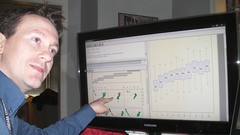 I think the key is to get help when you need it. I didn't like math initially, because a lot of the notation and terminology confused me. But I realized that when I sought out help from my instructors, and had the mathematics explained to me in plain English, the concepts became easier to understand. I think there are few feelings of accomplishment greater than those you experience than when you finally have that "a-ha" moment with something you previously didn't understand. What I find is that even if you become an expert in your field, it is rare that you completely understand everything at once - it is usually a gradual process. I also think it is good to fail occasionally, because when you fail you get the opportunity to learn from your mistakes. Failure also helps frame things in your mind differently. Learning is an interactive and iterative process. When you try something and it doesn't work, you go back and try something else. Persistence turns into knowledge through failure and success, and sooner or later you are going to learn it.
I think the key is to get help when you need it. I didn't like math initially, because a lot of the notation and terminology confused me. But I realized that when I sought out help from my instructors, and had the mathematics explained to me in plain English, the concepts became easier to understand. I think there are few feelings of accomplishment greater than those you experience than when you finally have that "a-ha" moment with something you previously didn't understand. What I find is that even if you become an expert in your field, it is rare that you completely understand everything at once - it is usually a gradual process. I also think it is good to fail occasionally, because when you fail you get the opportunity to learn from your mistakes. Failure also helps frame things in your mind differently. Learning is an interactive and iterative process. When you try something and it doesn't work, you go back and try something else. Persistence turns into knowledge through failure and success, and sooner or later you are going to learn it.
I am sort of jealous that I didn't grow up nowadays because there are so many educational resources available to kids other than just their teachers. There are some great online resources, such as the Khan Academy, where kids can explore many different topics in an interactive format. Go and explore different ways of looking at the subject of mathematics.
Do you have any suggestions for how students in middle school can get practical experience in your field? Are there specific courses you would recommend?
Though the subjects are broad at the middle school level, it is important to get the basics down. Learning things like the scientific method and getting a broad idea of math in general is very important. Once you get to college you can start learning more specific information within those subjects. I think it is safe to say that I probably don't really love math in general, but I love statistics. Statistics is a specific area within mathematics that I really enjoy because I see the power of it.
Are there exciting things happening in your field that could involve students who will enter the field in 5-15 years?
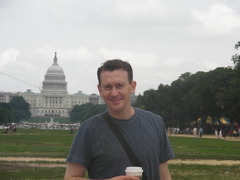 I think there have been leaps and bounds of progress made in applying computer power to statistical problems. In the past, before I was in the field, there were some problems that were seen as almost impossible to solve because it just took too long to figure them out. You couldn't really do them by hand. As computer power has been advancing, there are problems that are now becoming tractable and other, new and emerging problems that can be solved with computing power. We have databases now that can be used to cross-reference billions of records and do calculations with those records that you just couldn't do years ago. I think that technology is always going to be changing and growing. I am a statistician, but I am always keeping an eye on what's happening in terms of computing technology.
I think there have been leaps and bounds of progress made in applying computer power to statistical problems. In the past, before I was in the field, there were some problems that were seen as almost impossible to solve because it just took too long to figure them out. You couldn't really do them by hand. As computer power has been advancing, there are problems that are now becoming tractable and other, new and emerging problems that can be solved with computing power. We have databases now that can be used to cross-reference billions of records and do calculations with those records that you just couldn't do years ago. I think that technology is always going to be changing and growing. I am a statistician, but I am always keeping an eye on what's happening in terms of computing technology.
There was a paper that came out a while ago about a mathematics problem that had been around for years that no one could ever really prove - it was on the optimal way of stacking cannon balls on the decks of ships in the water. There was always a hypothesis or conjecture about the most efficient way to stack them, but no one could really prove it until computing power had really caught up to the problem. Then in 1998, the mathematics professor, Thomas Hales, from my alma mater, the University of Michigan, used sheer computing power to basically prove the conjecture. We always keep an eye out for how new technology could change a process that has been done manually and more slowly in the past.
The Stats on Stats:
- According to national salary data, the salary of a statistician ranges from $43,284 - $119,948 per year.
- The math problem mentioned above is called the Kepler Conjecture, and first arrived on the mathematics scene in 1611. A solid proof didn't appear until 1998, and verification of this proof is still being conducted.
- The use of statistical methods dates back to at least the 5th century BCE.
- Statisticians don't only work in the field of public health. Statistics can be applied to a large number of fields, including astronomy, economics, education, political science, weather tracking, farming and even sports!
Key Terms:
Anecdotal: Based on personal observation, case study reports, or random investigations rather than systematic scientific evaluation.
Bioterrorism: Terrorist acts involving the use of harmful agents and products of biological origin, as disease-producing microorganisms or toxins.
Economics: The science that deals with the production, distribution, and consumption of goods and services, or the material welfare of humankind.
Epidemiology: The branch of medicine dealing with the incidence and prevalence of disease in large populations and with detection of the source and cause of epidemics of infectious disease.
Hypothesis: A proposition, or set of propositions, set forth as an explanation for the occurrence of some specified group of phenomena.
Infectious Disease: A disease resulting from the presence and activity of a pathogenic microbial agent.
Iterative: Repeating.
Listeria: A genus of aerobic parasitic bacteria found in the feces of humans and other animals and on vegetation.
Microbiology: The branch of biology dealing with the structure, function, uses, and modes of existence of microscopic organisms.
Radiology: The science dealing with x-rays or nuclear radiation, especially for medical uses.
Salmonella: Any of several bacteria of the genus Salmonella, that may enter the digestive tract of humans and other mammals in contaminated food.
Sociology: The science or study of the origin, development, organization, and functioning of human society.
Surveillance: A watch kept over a person, group, etc.
(adapted from www.dictionary.com)


















